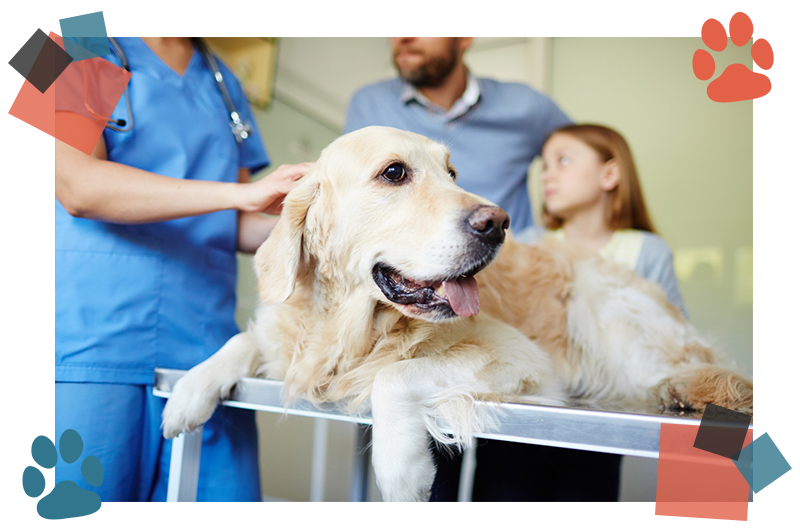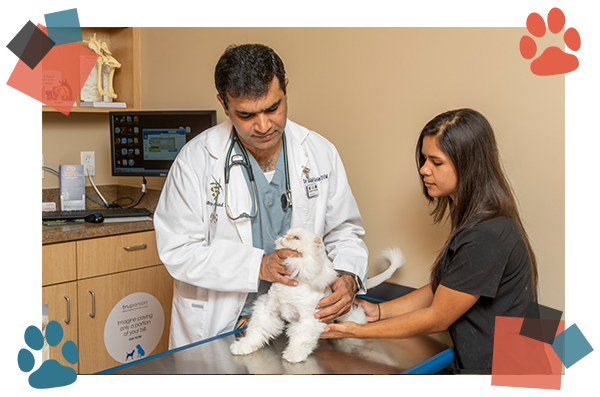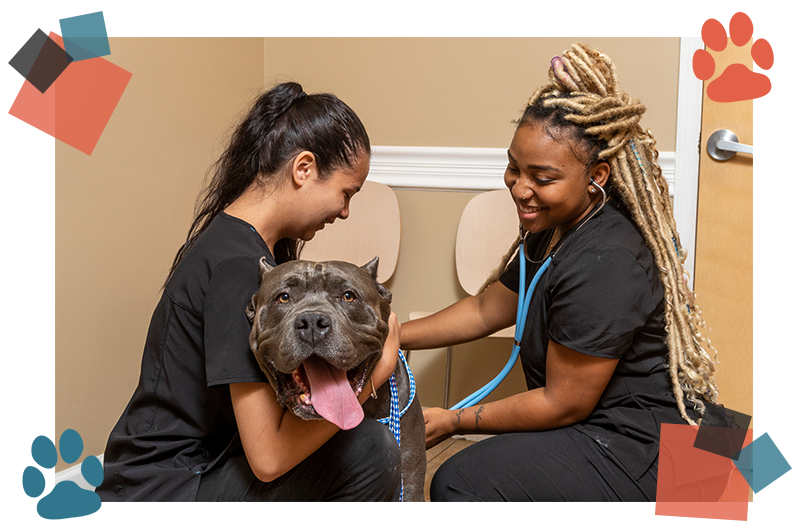Extended hours
Exceptional Care When You Need It Most
Emergencies tend to happen at inconvenient times. We offer extended office hours to be available when you need us most. Contact us immediately if your pet is exhibiting concerning symptoms.


Board-Certified Veterinarian & Team
Expert Emergent Care
Our experienced team are trained to spot and respond to emergency situations quickly and accurately. Pets in distress will be seen without an appointment to ensure they receive the priority care they need. This ensures we find the root of the problem and subdue uncomfortable symptoms as soon as possible.
Know the Signs
As a pet owners, it’s important to know concerning symptoms. In situations where trauma is obvious, like a dog fight or car accident, emergency vet care is clearly needed. Other symptoms that present red flags include ingestion of toxic materials, difficulty breathing, seizures, and swelling or hives.
We can treat complex emergencies
Advanced In-House Technology
Not knowing what is wrong with your pet can be scary. We’ve built an advanced in-house lab to help us get an answer (and solution) to your pet’s health problem. Our team can conduct bloodwork, ultrasounds, x-rays, and emergency surgeries in-house without needing to send you to another veterinary clinic.

Faq
When is it an emergency?
It is considered an emergency if your pet has experienced a trauma (hit by motor vehicle, blunt or falling object from a few feet) or is experiencing any of the following conditions:
- Unconscious
- Vomiting or diarrhea for more than 24hrs (especially vomiting blood)
- Experiencing seizures
- Suspect a broken bone(s)
- Can’t feel their heartbeat or they aren't breathing
- Trouble breathing or something lodged in their throat
- Bleeding from eyes, mouth, nose, or found in their urine or feces
- Believe they have ingested toxins (antifreeze, rat poison, bleach, household cleaners, medication they are not prescribed, etc.)
- Male cat is straining to urinate or unable to
- In extreme pain (whining, shaking, refuse to socialize)
- Collapse suddenly and can’t stand
- Suddenly becomes disoriented and starts bumping into things
- Injury or irritation to your pet’s eyes or suddenly appear they are blind
- Symptoms of heat stroke
- Pregnant cat or dog gone more than 3-4 hrs between delivering puppies or kittens
Please contact us immediately if they are experiencing any of the above conditions to see if emergency care is required. At Dr. Phillips Animal Hospital, we treat all the above conditions with care and diligence. We are serious about your pet’s health, safety, and your trust in allowing us to care for them.
How do you transport your pet?
If your pet is in pain or distress, approach them with care. Even loving pets can act aggressively with biting or scratching when they are in this state. Please ensure a family member, friend, or yourself contacts us immediately at (407) 353-2579 to start preparing for your pet’s arrival.
For dogs:
- If they show signs of aggression or threaten your safety, get help immediately
- Approach them calmly and slowly
- Kneel down from a safe distance and say their name
- Create a makeshift stretcher to transport them if necessary
- For spinal injuries always support their neck and back during transport
For cats:
- Gently place a towel or blanket over their head to prevent biting
- Slowly lift your cat (get assistance if needed) and place in an open top carrier or box
- Support their head and avoid twisting their neck incase they have suffered a spinal injury
What happens at arrival?
Please contact us before arrival to allow our team to prepare everything we need to care for your pet. If it is an emergency, we want to be able to help immediately. Our staff will also assist with carrying your pet in if it is required.
Upon arrival:
- Our team will examine and treat your pet as promptly as possible
- Preference and priority is given to all pets facing a life-threatening condition, regardless of the order of arrival (even if this interrupts an examination or treatment in progress)
- Your pet will be stabilized (administered IV fluids, pain medications, oxygen therapy, blood or plasma transfusions when necessary)
- A staff will walk you through what is happening and consult all owners before conducting any major treatment or procedures
How to Get Started

Step One:
Call us immediately during an emergency – (407) 352-2579

Step Two:
Our veterinary experts will walk you through your pet’s immediate needs.

Step Three:
Transport your pet to our office location for us to provide fast and exceptional emergency care.


